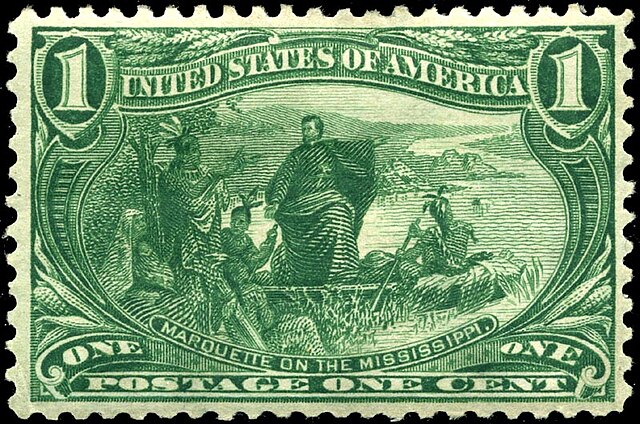The Trans-Mississippi Issue is a set of nine commemorative postage stamps issued by the United States to mark the 1898 Trans-Mississippi Exposition held in Omaha, Nebraska. The finely engraved stamps depict various scenes of the West and are presently valued much by collectors. This was only the second commemorative issue offered by the U.S. Post Office and closely followed the pattern of its predecessor, the Columbian Exposition series of 1893: both sets appeared in conjunction with important international world's fairs; both offered a wide range of stamp denominations; both adopted the double-width stamp format to accommodate pictorial tableaux.
The 1-cent value depicted Father Marquette on the Mississippi River.
Flag cancel used on a 2¢ Trans-Miss
"Farming in the West" with cancellation stamp from D.C.
"Indian Hunting Buffalo"
Trans-Mississippi Exposition
The Trans-Mississippi and International Exposition was a world's fair held in Omaha, Nebraska, from June 1 to November 1 of 1898. Its goal was to showcase the development of the entire West from the Mississippi River to the Pacific Coast. The Indian Congress was held concurrently. Over 2.6 million people came to Omaha to view the 4,062 exhibits during the five months of the Exposition. President William McKinley and William Jennings Bryan were among the dignitaries who attended at the invitation of Gurdon Wattles, the event's leader. A hundred thousand people assembled on the plaza to hear them speak. The Expo stretched over a 180-acre (0.73 km2) tract in North Omaha and featured a 2,000-foot-long (610 m) lagoon encircled by 21 classical buildings that featured fine and modern products from around the world.
East portion of Lagoon. Gondolas and Swan Boat with passengers. Machinery & Electricity Building, Twin Tower Restaurants, and Colonnade visible to the northeast
A young Sioux boy poses with a club while part of a "living display" at the Exposition
Night illumination, Grand Court, Trans-Mississippi and International Exposition, Omaha, Nebraska, 1898
Bi-color essay for the $2 stamp (note: the Harvesting in the West vignette was ultimately reassigned to the 2¢ stamp and retitled "Farming in the West").








